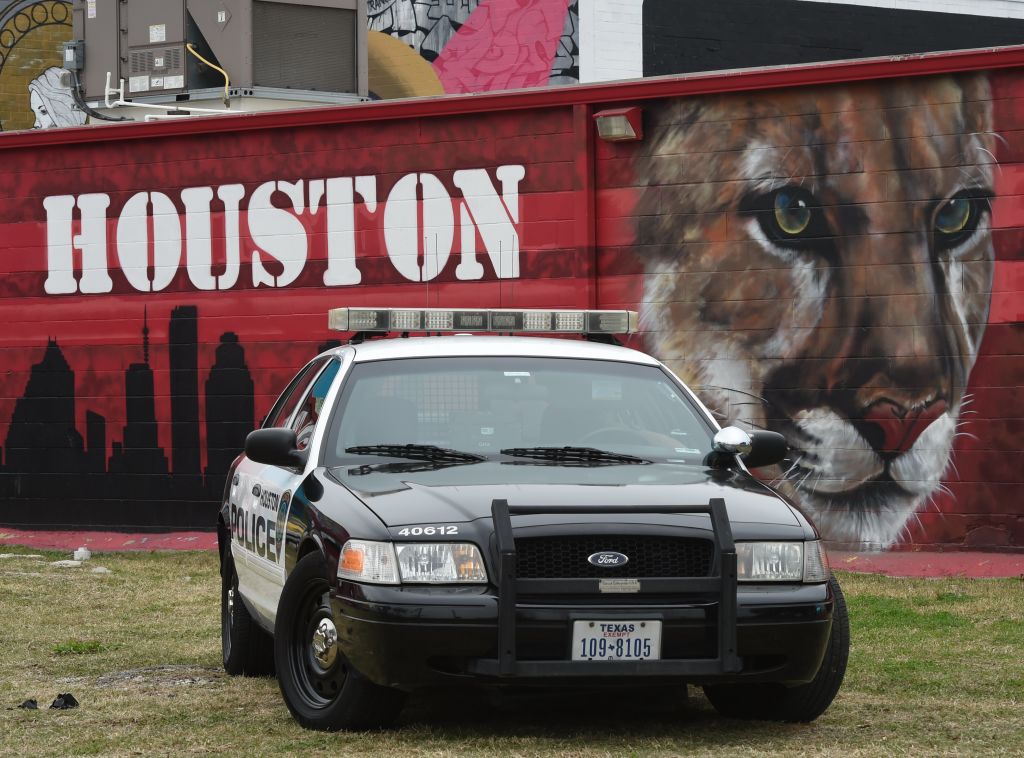During the Pandemic, Houston Cops Went Undercover and Arrested a Homeless Man Over 0.6 Grams of Meth
As Texas lifts its COVID-19 restrictions, the city’s jail remains overcrowded and its police and prosecutors continue to operate as normal.

Last year, according to documents obtained by The Appeal, the Houston Police Department received a tip that drugs were being traded in an encampment for unhoused people at the 700 block of Booth Street, near Moody Park. On Oct. 20, as COVID-19 cases were just beginning to surge around the nation to previously unseen levels, at least two officers took an undercover stroll through the encampment.
In charging paperwork, the officers said they observed a man, later identified as 57-year-old Israel Iglesias, sitting inside his own dwelling. They asked him where they might be able to find some methamphetamine. Iglesias said he could grab some from someone else in the encampment—so the cops gave him some money, and Iglesias walked off. He returned and, allegedly, handed the officers a baggie of 0.6 grams of methamphetamine.
“I then gave defendant Iglesias a tip (City of Houston buy money) for his services,” Officer S. Wakefield later wrote in a sworn statement. “We then left the location.”
It took more than three months for Houston law enforcement agents to charge Iglesias with a crime—felony delivery of a controlled substance. Iglesias was arrested on Feb. 8. Public defenders asked the judge to offer him a $1,500 bond. But, as Harris County District Attorney Kim Ogg’s office wrote, because of Iglesias’s previous arrest record, prosecutors demanded he be held without bond indefinitely. (A local judge ultimately disagreed with that request and granted Iglesias a $1,500 cash bail amount.)
Iglesias’s time in custody did not last long: He died the following day after suffering a “medical episode” in the jail’s intake unit. Documents state that Iglesias likely lived with a mental illness. (The Houston Chronicle first reported on Iglesias’s death.)
A spokesperson for the Harris County Sheriff’s Office told The Appeal that no further information about Iglesias’s death is available and that his autopsy is not complete. Representatives for the Houston Police Department and Ogg did not respond to requests for comment.
As The Appeal reported on Jan. 25—one week before Iglesias was charged—the Harris County Jail population had already reached dangerous levels, in part because of physical damage that courtrooms sustained during 2017’s Hurricane Harvey, COVID-19 related slowdowns, and an outright refusal by Houston law enforcement leaders to change their arresting or charging habits during the pandemic.
Harris County Sheriff Ed Gonzalez had for months been proposing lists of people his office believed were safe enough to release early from the jail to reduce overcrowding amid the pandemic. But in virtually all cases, Ogg’s office objected.
“Rather than mitigate the public health catastrophe that inevitably results from holding thousands of people in cages in close quarters every night, the police and the District Attorney’s office have continued business as usual, filing enormous amounts of low-level charges that ultimately put individuals and the community (including law enforcement) at risk,” Jay Jenkins, Harris County project attorney for the Texas Criminal Justice Coalition, a nonprofit justice reform group, told The Appeal via email in January.
On March 2, Governor Greg Abbott issued an executive order to rescind the state’s mandates about wearing a mask and social distancing. The executive order also allows for large gatherings such as concerts and sporting events to resume. But the state never restricted incarceration. As of Monday, Houston’s main jail held 8,923 people—no different than when the pandemic began, and more than when media outlets began highlighting the jail’s overcrowding in January. (The population dropped to a low point of 7,363 in April 2020.) Of the people currently held in the Harris County Jail, 87.4 percent are being held pretrial and 56.9 percent were arrested by Houston police.
As of last Wednesday, 2,819 people held in the jail had tested positive for the coronavirus, and eight people had died. Although new jail bookings are down by 25 percent during the pandemic, advocates argue that Iglesias’s death shows that Houston police officers and prosecutors have not sufficiently revamped their practices in response to the pandemic. As of Monday, 855 people in the Harris County Jail were incarcerated on drug-related charges—of that number, 457 had been arrested by Houston police.
(The police department’s narcotics squad, in particular, has faced severe criticism ever since officers executed a January 2019 no-knock raid and killed a married couple and their dog. Investigators subsequently revealed significant alleged corruption within the narcotics division.)
In a letter to Harris County officials last week, 13 civil rights and justice organizations in Houston—including the Texas Organizing Project, Texas Fair Defense Project, Texas Criminal Justice Coalition, and Mutual Aid Houston—demanded action to reduce the jail population by 4,000 people. The advocates wrote that conditions in the jail were particularly horrific during the winter storm that swept through Texas in February and caused major power outages.
“One veteran caged pretrial reported that people in the jail were selling water as a ‘commodity,’” the letter stated. “Others reported unflushable and overflowing toilets: ‘People are crapping on top of more crap. It’s horrendous.’ While the winter freeze brought increased attention to the conditions in the jail, advocates have been sounding the alarm for months about the mounting crisis.”
As a result, the local civil rights groups are demanding that the county offer bond to all people charged with theft or drug offenses, and hold emergency bail hearings for anyone still stuck inside the jail. For some, like Israel Iglesias, it’s already too late.
